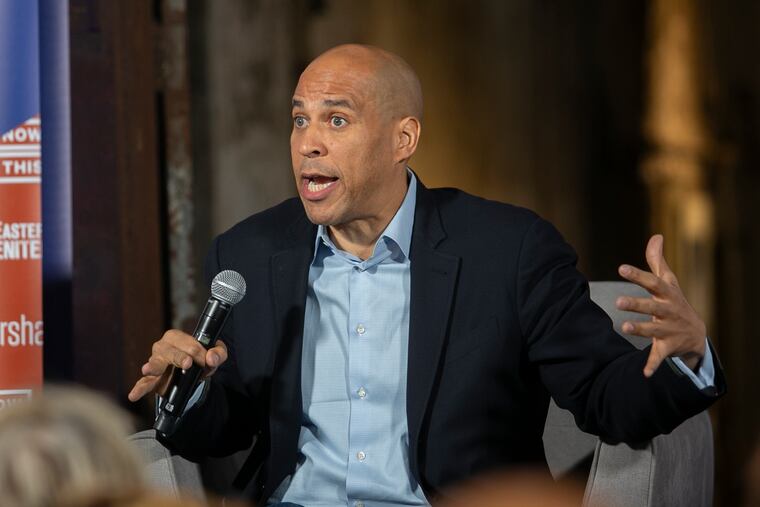Cory Booker slams opponents for skipping Philly prison reform town hall: ‘Where are you? Seriously.’
Only three candidates showed to take questions from formerly incarcerated people in Philadelphia.

In a small atrium of interconnected cell blocks at Eastern State Penitentiary, once a national model for incarceration, three Democratic candidates for president gathered to discuss improving the criminal justice system.
N.J. Sen. Cory Booker thought the list of attendees was far too few, considering 18 people are still seeking the party’s nomination.
“Where are you today?" Booker asked his absent opponents. "Where are you? Seriously. This is a major national crisis.”
The Justice Votes 2020 Town Hall, organized by Voters Organized to Educate, a group of formerly incarcerated people, and the Marshall Project, was held at Philadelphia’s historic prison. Sen. Kamala Harris, Booker, and billionaire Tom Steyer attended the town hall, answering questions from MSNBC reporter Ari Melber and members of the group who had served jail time.
“The reason we wanted to do this today is for the public to understand … that we are not a throwaway population," said the Rev. Vivian Nixon, who served prison time in New York and now helps run VOTE. "We are human beings.… We are Americans. We are voters and our needs, our opinions, matter.”
Harris, who as district attorney in San Francisco and then California attorney general established programs to help the formerly incarcerated acclimate to life outside prison, was asked if she thought she went too far as a prosecutor. She instead challenged Melber to find anyone else in the race who has had such a direct impact on the system.
“What have they actually done?” she said. “And then I’m happy to talk more about my record.”
The forum was streamed live on NowThis, an online news organization that cosponsored the event.
Harris lamented the lack of quality job training in jails. “Not just woodshop," she said. Speaking afterward with reporters, she mentioned the use of prisoners to fight wildfires raging in California.
“It’s wrong to have prisoners paid substandard wages to do the work the government is supposed to do at great risk to themselves," she said. “That needs to change. We need to hire [the] formerly incarcerated and give them the certificates so they can do the jobs.” Harris noted other barriers to reentering society, including obstacles for former inmates to receive federal funding for student loans, Pell educational grants, and housing support.
Steyer, a former hedge fund manager, once invested in private prisons, for which he has been criticized during the campaign.
Steyer’s company purchased $90 million of Corrections Corp. of America stock in 2004. Steyer said he regretted the deal and later sold his stake in the company. “I talked to a bunch of activists and I realized it’s just wrong, so I sold it, and I’ve always felt like, ‘Gee, I was really dumb.’ I regret it. It was a mistake, so I corrected it on my own.”
Melber asked Steyer if he had ever hired “an ex-convict,” drawing jeers from the crowd for using the term. Steyer said he did not recall hiring a “formerly incarcerated” person, but supports prohibiting employers from asking job applicants about criminal convictions. He helped finance a campaign for such legislation in California.
In a sign of how far to the left much of the party has come on marijuana, Steyer later said he hoped the fact that he’d never inhaled in the United States would not be held against him. (He has smoked abroad and supports legalizing marijuana.) Steyer and Booker also told reporters that their administrations would not seek to block supervised injection sites, such as the one proposed for Philadelphia.
Booker, whose criminal justice plans have been a key component of his campaign, touted his time as mayor of Newark, N.J., when he set up youth and drug courts and the city’s first reentry office.
“It’s very easy to put a tab on your website and check a box to say you care about this issue — what have you been doing?” he asked.
Booker was impassioned on what he called the excesses of the penal system. “This is a nation that tortures people in prison," he said. "I’m not using that term loosely — juvenile solitary confinement, shackling of pregnant women. This is a moral issue that is a cancer on the soul of our country.”
Pressed to explain his opposition to restoring voting rights for violent offenders (he supports it for those who were imprisoned for nonviolent crimes), Booker said: “There’s 100 things I can do that will be more empowering then fighting something that we don’t have the Democratic Party on board” with.